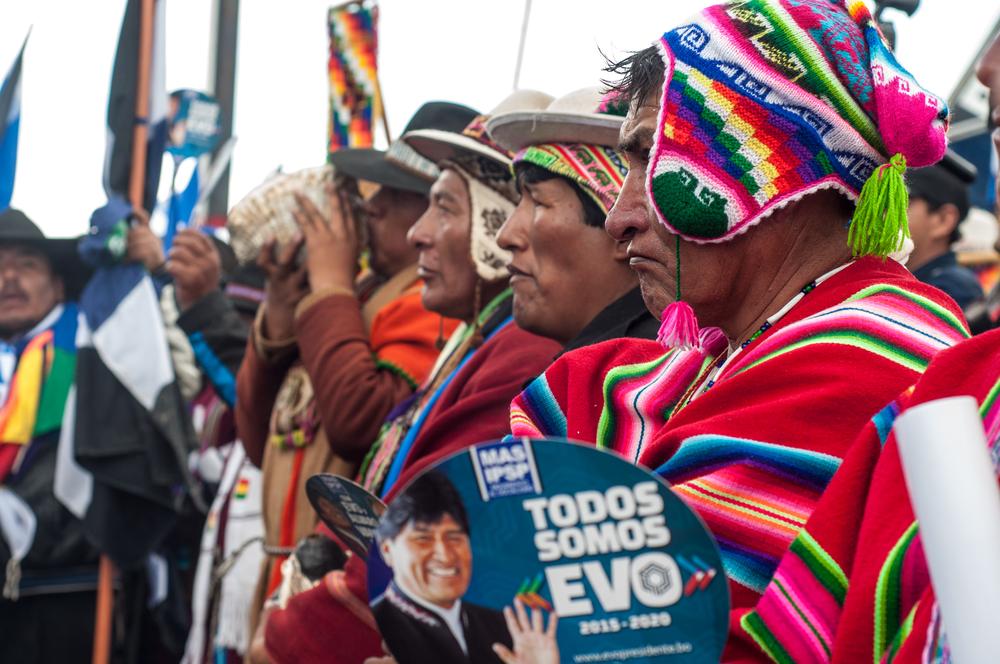

Published Nov. 15 on pagina12.org.ar. Translation by John Catalinotto.
This time peasants with red ponchos, women and men with hats, who came from afar, from above in the highlands. Then they joined all those who could get to the city of El Alto. Others were held back as they tried to get to La Paz. This capital city has become the scene of daily mass mobilizations, town councils and repression. The river of people gathers — those who turned against the coup d’état.
Thursday, Nov. 14, ended without tear gas or police motorcycles. The police and military maintained their usual encirclement of Plaza Murillo, the center of national political power. There, the seat of government, the legislative branch and the vice presidency are located, among other institutions. The central events on that day took place on those blocks.
On one hand, the Senate elected a new president — Eva Copa, a native of the city of El Alto. So too is Sergio Choque, who had been elected president of the Chamber of Deputies the night before. With the swearing in of both new presidents, the direction of legislative power was redefined. Both belong to the [pro-Morales party] Movement Toward Socialism (MAS), which holds two-thirds of the seats in the legislature.
Simultaneously, Jeanine Añez, the self-proclaimed [coup] president, appointed five more ministers to her cabinet. Two of them, named Nov. 14, made statements alerting the public to the policies which will be followed by the government appointed outside the Constitution — in an attempt to build an institutional image.
The first named was Minister of the Transitional Government Arturo Murillo, who announced he will undertake a “hunt” against three former officials of the overthrown government: Raúl García Linera, Juan Ramón Quintana and Hugo Moldiz, all for “seditious acts.” The second named was Communication Minister Roxana Lizarraga, who threatened “journalists or pseudo-journalists,” both national and international, who “commit sedition.”
High commanders of the Bolivian Armed Forces and the Bolivian National Police were also elected to the transitory government. The few announcements made by this government have been a double threat within a general framework where there has been news of repression, deaths, serious injuries and confrontations with the military deployed in the streets and highways.
Coup d’etat denies it’s a coup d’etat
The coup strategy faces an unsolvable contradiction. In effect, it is a coup d’état that denies being a coup d’état. Coup leaders seek to build an institutionality outside the law to sustain this false narrative. But, in their self-proclamations and announcements of hunts for MAS leaders and journalists, they show the coup’s anti-democratic character.
That has become clear for those who mobilize day after day and have as a main demand that Añez resign. They accuse her of being a coup-plotter and an [anti-Indigenous] racist. These reasons, together with the demand for Evo Morales’ return, have set in motion an uprising in different parts of the country and have created a movement of people toward La Paz. (But not everyone in the mobilizations is raising the demand for Morales’ return.)
It is expected that between Friday and Saturday [Nov. 15-16], marchers from rural areas in the interior of the country will arrive in the capital. The marchers include coca growers from the tropics, who on Thursday were protesting in the city of Cochabamba.
The coup d’état thus faces an uncertain future. On the one hand, it has to face a growing process of national mobilization, which is increasingly marked by racial cleavage. Those who mobilize recognize that the self-appointed president, Añez, with Fernando Camacho and Carlos Mesa, are coup leaders opposed to the Indigenous nations. They know about these politicians’ history and the attacks their forces made on the Whipala flag [symbol of the Andean Indigenous peoples].
On the other hand, the coup leaders must resolve their announced promise that they will hold presidential elections within a period of no longer than 90 days. That resolution is part of the coup framework that has four central steps: the overthrow of Morales and his administration, the formation of a new transitional government, the call for elections and the holding of elections.
Coup leaders face MAS-led legislatures
Right now what is taking place is forming the new government. This step faces a difficulty: It must name new officials to the Supreme Electoral Tribunal — something that must proceed through the legislative bodies where the MAS has presidencies and majorities.
Will the coup-makers seek an agreement with the political forces it overthrew? Or will they instead attack the legislative body, [providing] even more proof that it really is a coup? Will MAS accept an agreement with the objective of being allowed to participate in elections?
The mobilizations are expected to increase in the next few days with the arrival of people who are coming from different departments in the country and the massive presence of demonstrators in El Alto, where Thursday night the people who died are being mourned by vigils.
There is already talk of more than 10 deaths in the country and more than 200 arrests. This is a provisional and approximate figure in the context of laws broken and persecution of journalists who do not comply with the coup order.
The epic struggle of the Palestinian people against the full weight of U.S. imperialism and…
The following report comes from the Bronx Anti-War Coalition organizers on a protest held in…
In the Canadian federal elections held on April 28, the Liberals won with 169 seats…
The following is Part 2 of a talk given by the author to a meeting…
Boston Students, professors and workers are confronting the Trump administration’s fascist crackdown at universities across…
Philadelphia Within days of Swarthmore students reviving a pro-Palestinian encampment on April 30, police arrested…